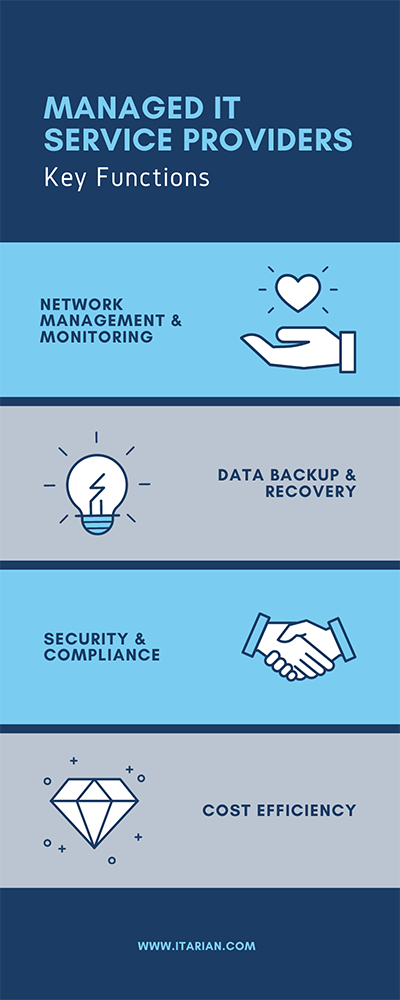Key Functions of MSPs
Network Management and Monitoring
One of the principal roles of an MSP is network management. This involves ensuring that your network infrastructure is up-to-date and functioning optimally. MSPs employ various tools to monitor network performance, bandwidth usage, and any signs of potential vulnerabilities that could lead to data breaches or system failures.
Data Backup and Recovery
Data is the lifeblood of any organization. MSPs provide robust data backup and recovery solutions that safeguard your important files and business data. Through automated backup systems and state-of-the-art recovery mechanisms, MSPs ensure your data is always accessible and safe from potential loss or corruption.
Security and Compliance
In today's digital world, cybersecurity is a significant concern for businesses of all sizes. MSPs offer comprehensive security services, including firewalls, intrusion detection systems, and secure data storage solutions. They also ensure that your organization complies with various regulations such as GDPR, HIPAA, and others, thereby minimizing the risk of legal data security and privacy issues.
Cloud Computing
Cloud services have become indispensable in modern business operations. MSPs facilitate smooth migration to the cloud, handle cloud management, and provide scalable solutions to meet your business needs.
24/7 Support
One of the standout features of MSPs is round-the-clock customer support. In an emergency or an unexpected glitch, experts are available 24/7 to provide immediate assistance. Advantages of Partnering with an MSP
Cost-Efficiency
Having an in-house IT department can be costly. MSPs offer scalable solutions tailored to your business needs, effectively reducing the cost of managing your IT infrastructure.
Expertise
By leveraging an MSP's extensive knowledge and experience, you gain access to the latest technologies and best practices in IT management. This allows you to keep up with industry trends and stay ahead of competitors.
Focus on Core Operations
Partnering with an MSP frees up your in-house team to focus on core business activities. This not only enhances productivity but also facilitates business growth and expansion.
Questions to Ask Before Choosing an MSP
- What services do you offer?
- Do you have experience in my industry?
- How flexible are your service packages?
- Can you provide references or case studies?
- What are your SLAs (Service Level Agreements)?

What Benefits Can You Gain with an MSP?
Makes Your IT Operations Reliable and Scalable
A trusted MSP can significantly improve the company's overall IT operations by providing expert staff and state of the art technological infrastructure. Moreover, they can bring clients with a wide variety of IT services that are scalable to meet changing needs. They can suggest and implement solutions that your company will need now and in the future.
In addition, competent MSPs offer round-the-clock help desk service. This enables employees to have a more seamless IT ticket resolution. Instead of waiting for assistance from overburdened in-house tech resources, tickets are processed and resolved quickly.
Another important service that MSPs offer is performance monitoring. With high-end firewalls, agents, and tools, managed service providers can oversee your IT network's performance. In case something goes wrong in your system, MSPs can flag them down and address them right away. Taking these steps can reduce any disruption to your business processes.
Improved Budgeting
Since you won't be required to purchase new IT infrastructure for monitoring and hire dedicated employees for IT management, you can reduce IT costs substantially. MSPs offer a lot of plans that cater to varying needs. This helps your company handle your IT inventory and predict accurate monthly or annual IT budgets.
Freeing Up Dedicated Resources
A reliable MSP can assign dedicated IT and resources to perform different tasks for your company. Your company can implement effective strategies on how to use your IT assets to achieve your business goals within budgetary restrictions.
Trailblazing Cybersecurity
MSPs can provide companies with multiple layers of cybersecurity through firewalls, applications, monitoring, filtering, and many more. They have the technology and expertise to keep cybercriminals out or to eliminate them immediately if ever they manage to penetrate their layered defenses. MSPs can also provide robust backups of critical data to ensure business continuity.
Updated IT and Compliance Requirements
MSPs guarantee that your company's IT network is regularly updated with the most effective version so compliance requirements are constantly met. With their state of the art technology portfolio, your company can reap multiple benefits without the need to research and implement it by yourself.
Regular Backups
What does an MSP offers you? Peace of mind. With backups and disaster recovery plans, your management team and employees can rest easy knowing that all your data and business applications are at a secure location. In case a man-made or natural event occurs, MSPs can quickly restore operations with backed-up data and applications. This way, you can dodge the consequences of costly downtime.
Managed Service Provider (MSP) FAQ
Answer: Managed Service Providers are specialized third-party organizations that operate and oversee a range of IT services on behalf of their clients. These services range from network management and cybersecurity to data backup and cloud services. Think of them as your IT department, but outsourced—enabling you to focus on core business functions while experts handle the tech aspects.
Answer: Traditional IT services are usually reactive and issue-based. That means when an issue arises, the IT department steps in to fix it, often resulting in downtime and business disruption. On the other hand, MSPs adopt a proactive approach to managing your IT infrastructure. They continuously monitor your systems, detect vulnerabilities before they become significant issues, and provide timely solutions, ensuring your business operations are smooth and uninterrupted.
Answer: Businesses of all sizes across various industries can benefit from using Managed Service Providers. Small and medium-sized enterprises (SMEs) often find value in outsourcing their IT needs due to limited resources. Larger corporations also leverage MSPs to supplement their in-house IT departments, ensuring optimal performance and security. Industries with high compliance standards, like healthcare, finance, and legal, can especially benefit from MSPs that specialize in those areas.
Answer: When choosing an MSP, consider factors like the range of services offered, industry experience, scalability, and Service Level Agreements (SLAs). It's crucial to assess whether the MSP can tailor their services to meet your specific business needs and whether they have a proven track record in your industry. Always request references or case studies to evaluate their performance and reliability.
Answer: Yes, MSPs are generally cost-effective compared to maintaining a full-fledged, in-house IT department, especially for small to medium-sized businesses. They offer scalable solutions, allowing you to pay for only the services you need. By proactively managing your IT infrastructure, MSPs can also reduce the costs associated with downtime and security breaches.
Answer: MSPs take data security and compliance very seriously. They offer a range of security solutions, including firewalls, intrusion detection systems, and secure data storage. MSPs also assist in ensuring that your organization meets industry-specific compliance requirements, such as GDPR, HIPAA, and others. Regular audits and assessments are conducted to maintain the highest standards of data security and compliance.
